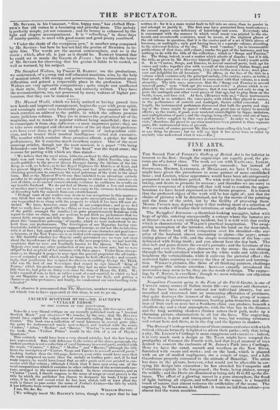ANCIENT scorrISH MUSIC—M R. DAUNEY'S "VULGAR ERROR."
TO TUC EDITOR or Tile sescrA•rou.
web, :Mb December IS3S.
Sin—In a very liberal critique on my recently published work on " Ancient Scottish Music?' you observe—" We wonder, by the way, that Mr. HAUNEY should have copied the vulgar error of constantly calling this book 'Ihrbes's Cantus."fhe book was a collection of vocal harmony m several parts (like the parts for instrumental music now-a-days) and marked with the words Cantus," Altus," ' and. 'Bassos." Cantos 'is no more the title of the book, than Violino Primo ' would be the title of a set of Ilaydn's Quartetts."
This certainly would have been a very absurd mistake, had the fact been as here represented. But, with deference to the writer of the above paragraph, the book in question is not a collection of vocal harmony in severadparts, marked with the words " Cantus," " Altus," " 'Medins " and " Bassos, ' although the title bears the inseript km of" Cantos, Songs and Fancies to sererall musical, parts." Looking flirther -than the titlepage, however, your critic would have seen that the work comprised no more than the melody or leading part ; and, if he had made inquiry, he would have found that no other parts leers ever' printed in con- nexion with Mat volume although I think that I have seen every one of the vocal compositions which it contains in other collections of the seventeenth cen- tury, arranged in the manner here described. In these circumstances and as " dantus ' (used, I should suppose, inn the sense of songs or vocal piece;) is the title by which the publisher has chosen to designate his book, I hope your critic, if he will not recant what he has here stated, will at least allow the work in future to pass under the name of Ihrbes's Cantus—the title by which it has hitherto been recognized nod referred to. written it : for it is a more venial fault to fall into an error, than to persist in and attempt to justify it. The first may have proceeded from inadvertence ; the second argues some deficiency of knowledge and sense. Everybody who is conversant with the manner in winch vocal music was printed in the six- teenth and seventeenth centuries, must be aware, at the slightest glance of the out volume in question, that it is the contra; part of a set of little pieces of harmony-, or madrigals ; each part having been in a separate volume, according to the universal fashion of the day. The word "cactus," (as in innumerable publications of that tune, still extant) marks the part of the harmony, and has nothing to do with the title of the collection ; which is " Songs and Fancies," &c. The thing, indeed, is not a matter winch admits of dispute: but if it did, the title, as given by Mr. DAENEY himself (page 20 of his work) would settle it. It is " Cantus, Songs, and Fancies, to several musical' parts, both apt for yokes and viola; together also with sevemil of the choicest Italian Songs, and new English ' Ayres all in three parts, (viz.) two (rubles and a bass; most plea- sant and- delightful for all humours." To affirm, in the face of the title to a volume which contains only the principal melody, (the cantos, canto, or treble,) that no other parts were ever printed in connexion with that volume, is a mere absurdity. The title says, moreover, that tine " Songs and Fancies in several inusicalcparts," were both apt for voices and viols ;" a phrase which is ex- plained, by the w4:11-known circumstance, that it was usual not only to sing in its tine madrigals and other vocal pieces of that age, but to play them on the treble, tenor, and bass viol. At first, (BERNEY tells us,) "these instruments were rallied m to reinforce the voice-parts, with which they played in unison, in the performance of motetti and madrigals, thence called concertati. At length, the instrumental performers discovered that both the .poetry and sing- ing of the times might be spared without any great loss or mjury to musical elleets ; as the words, if good, were rendered m pint elligible by fugue, imitation, and multiplication of parts ; and the slinging, being often coarse and out of tune, could be better supplied by .their own pi rtialnance.' In order to be "apt for viols," therefore, the pieces in question mast have been printed in three separate parts, like instrumental trios at present. We cannot, of course, prevent Mr. lituxEy from calling this book " Ca ntus," or any thing Inc phrases; but we will say that it has never been so called by itoylmily who understood what it was.—En.]































 Previous page
Previous page